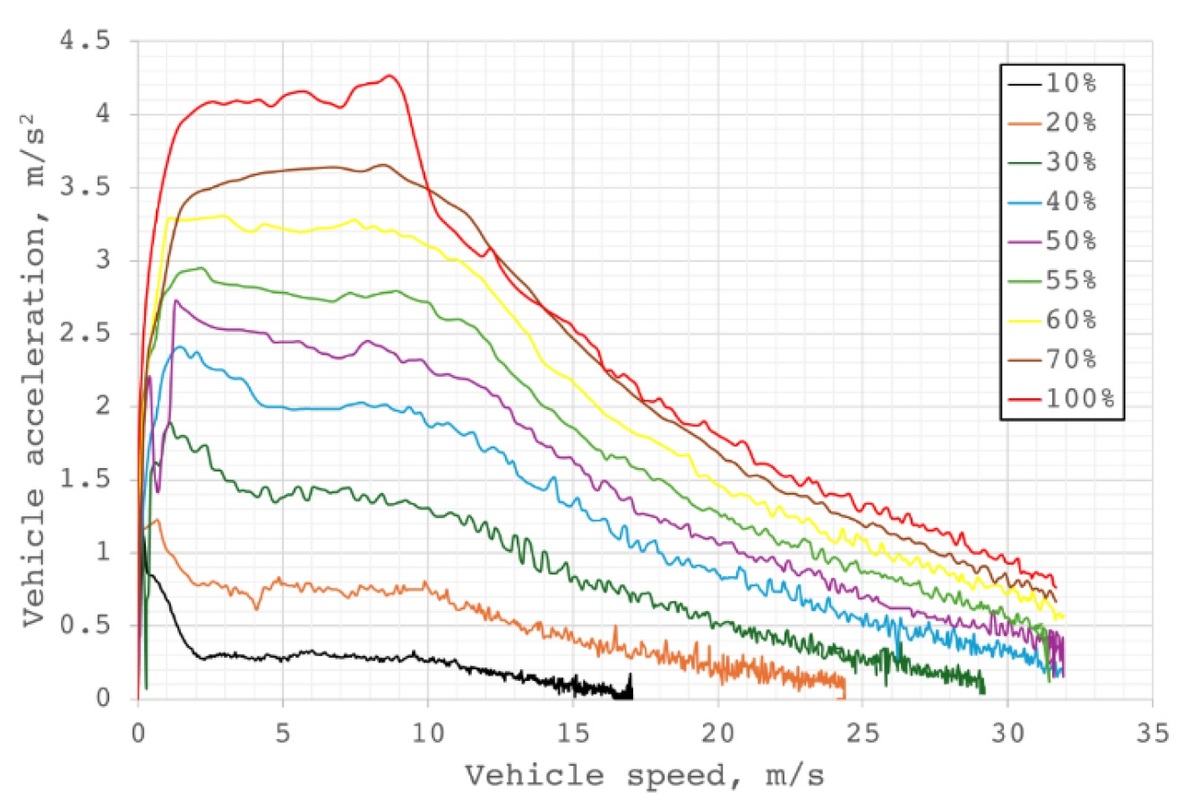Current issue
Online first
Archive
About the Journal
Aims and scope
Publisher and Editorial
Advertising policy
For Authors
Paper review procedures
Procedures protecting authentic authorship of papers
Paper preparation manual
Plagiarism check
Publication ethics
Reviewers
APC
Editorial and Scientific Board
Contact
Reviewers
Acceleration dynamics of a passenger vehicle with an electric powertrain and their impact on the mileage energy consumption
1
Department of Vehicle, Opole University of Technology, Poland
2
Katedra Pojazdów, Politechnika Opolska, Poland
Submission date: 2025-04-08
Final revision date: 2025-06-07
Acceptance date: 2025-06-09
Online publication date: 2025-07-22
Publication date: 2025-11-14
Corresponding author
Combustion Engines 2025,203(4), 3-8
KEYWORDS
TOPICS
ABSTRACT
The aim of the paper was to analyse the effect of an electric vehicle's acceleration intensity on energy consumption in a real road test. The research involved vehicle the urban Skoda Citigo-e iV equipped with a proprietary measurement system. Acceleration tests were carried out at different accelerator pedal positions, analysing kinematic and energy parameters, including energy consumption, speed, acceleration and power. The paper introduces a dynamics index, combining power train capacity with unit energy consumption, allowing an objective comparison of vehicle energy and traction efficiencies. The results indicate that moderate acceleration up to about 40% pedal position is the most energy efficient. Further increases in power result in a significant increase in energy consumption with little dynamic acceleration. The electric vehicle's acceleration dynamics were compared to those of an internal combustion vehicle which showed similarity in terms of the moderate acceleration area. The results show that moderate acceleration is the most energy-efficient and the presented acceleration dynamics index allows for an objective comparison of the efficiency of different power trains.
REFERENCES (12)
1.
Badin F, Le Berr F, Briki H, Dabadie J-C, Petit M, Magand S et al. Evaluation of EVs energy consumption influencing factors: driving conditions, auxiliaries use, driver’s aggressiveness. 2013 World Electric Vehicle Symposium and Exhibition (EVS27). 2013;6(1):112-123. https://doi.org/10.1109/EVS.20....
2.
Berry M. The effect of driving style and vehicle performance on the real-world fuel consumption of US light-duty Vehicles. Doctoral Thesis. 2010. https://dspace.mit.edu/handle/....
3.
Cieślik W, Szwajca F, Golimowski J. The possibility of energy consumption reduction using the ECO driving mode based on the RDC test. Combustion Engines. 2020;182(3):59-69. https://doi.org/10.19206/CE-20....
4.
Davari MM, Jerrelind J, Trigell AS. Energy efficiency analyses of a vehicle in modal and transient driving cycles including longitudinal and vertical dynamics. Transport Res D-Tr E. 2017;53:263-275. https://doi.org/10.1016/j.trd.....
5.
Ferreira H, Rodrigues CM, Pinho C. Impact of road geometry on vehicle energy consumption and CO2 emissions: an energy-efficiency rating methodology. Energies. 2020;13:119. https://doi.org/10.3390/en1301....
7.
Graba M, Bieniek A, Prażnowski K, Hennek K, Mamala J, Burdzik R et al. Analysis of energy efficiency and dynamics during car acceleration. Eksploat Niezawodn. 2023;25(1):17. https://doi.org/10.17531/ein.2....
8.
Kropiwnicki J, Gawłas T. Evaluation of the energy efficiency of electric vehicle drivetrains under urban operating conditions. Combustion Engines. 2023;195(4):28-34. https://doi.org/10.19206/CE-16....
9.
Mamala J, Graba M, Bieniek A, Prażnowski K, Hennek K, Kołodziej S et al. Evaluation of energy consumption in the acceleration process of a passenger car. Combustion Engines. 2022;190(3):35-44. https://doi.org/10.19206/CE-14....
10.
Mamala J, Graba M, Stasiak P. Energy efficiency of the electric drive system of a passenger car under normal operation conditions. In: Rackov M, Miltenović A, Banić M. (eds) Machine and Industrial Design in Mechanical Engineering. KOD 2024. Mechanisms and Machine Science. 2024;174. Springer, Cham. https://doi.org/10.1007/978-3-....
11.
Shuklinov S, Uzhva A, Lysenko M, Tishenko A, Novikova Y. Maximum automobile acceleration. Automobile Transport. 2021;49:13-22. https://doi.org/10.30977/AT.22....
Share
RELATED ARTICLE
We process personal data collected when visiting the website. The function of obtaining information about users and their behavior is carried out by voluntarily entered information in forms and saving cookies in end devices. Data, including cookies, are used to provide services, improve the user experience and to analyze the traffic in accordance with the Privacy policy. Data are also collected and processed by Google Analytics tool (more).
You can change cookies settings in your browser. Restricted use of cookies in the browser configuration may affect some functionalities of the website.
You can change cookies settings in your browser. Restricted use of cookies in the browser configuration may affect some functionalities of the website.



